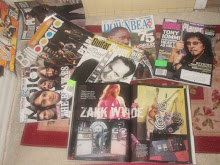I was ready about to rock this Wednesday evening (12/3/08) in Toto concert, at Empire Palace, Surabaya. No need to worry about “to do list” until Friday (as I am also planning to act like “Youth Gone Wild” in Skid Row concert the following evening, i.e. Thursday), I have done all homeworks in advance. In short, as in Edane’s song, these two days are “Time to Rock”. What a rock city Surabaya is (Kiss ever wrote song called “Detroit Rock City”, so did Superman is Dead with “Kuta Rock City”. I hope that Boomerang or Power Metal does the same one day). However, some monkey business got me and other hundreds of people disappointed. The band’s equipment was not cleared yet by the Custom Office. It was left stranded somewhere in Sukarno-Hatta Airport. While I don’t know who was the culprit - the promoter, the local event organizer, the logistic partners, the Toto management itself, or the government officials? – This case reminds me on an international annual report so called “Doing Business”.
Overall, the ease of doing business in Indonesia has improved, from rank 133 in 2007 to rank 123 in 2008. In “Trading Across Borders” category, Indonesia actually jumped even higher in the international ladder, from rank 61 in 2007 to rank 41 in 2008. It’s pretty good. Yet, when better is expected, to be good is not good enough. Look at the further detail picture. In terms of monetary costs, it is true that Indonesian cost to export and cost to import (US$ per container) are lower than those in other countries in the region or in the OECD countries. However, in terms of time (days), it takes at least twice longer time for both export and import in Indonesia compared to best practices. So, if you agree that time is money, (time-adjusted) costs for export and import in Indonesia might be actually much higher than they firstly appear. Further, the “Doing Business” report hasn’t take into account more complete logistics indicators like the following (proposed by Hausman, Lee, and Subramanian) :
Overall, the ease of doing business in Indonesia has improved, from rank 133 in 2007 to rank 123 in 2008. In “Trading Across Borders” category, Indonesia actually jumped even higher in the international ladder, from rank 61 in 2007 to rank 41 in 2008. It’s pretty good. Yet, when better is expected, to be good is not good enough. Look at the further detail picture. In terms of monetary costs, it is true that Indonesian cost to export and cost to import (US$ per container) are lower than those in other countries in the region or in the OECD countries. However, in terms of time (days), it takes at least twice longer time for both export and import in Indonesia compared to best practices. So, if you agree that time is money, (time-adjusted) costs for export and import in Indonesia might be actually much higher than they firstly appear. Further, the “Doing Business” report hasn’t take into account more complete logistics indicators like the following (proposed by Hausman, Lee, and Subramanian) :
- Time. Total time for a trade transaction; document processing time; custom clearance; technical control; vessel turnaround.
- Cost. Total cost for a trade transaction; port & terminal charges; document processing; custom clearance cost; inland freight.
- Complexity. Signatures for a trade transaction; number of documents per transaction; percent of containers inspected; level of inspection; criteria for inspection.
- Efficiency. Number of containers loaded per berth hour; port shutdown days; inland transport speed; frequency vessel calls at port.
(Note: while these indicators are originally observed for and derived from trade across borders through seaport, I think they are also applicable for good flows through airport).
So, while various forms of tariff and non-tariff trade barriers are obvious and easier to manage, I think Hummels (2001) was right, time (and also efficiency and complexity) are invisible barriers for trade. It is thus harder to manage and to remove. Private enterprises and government agencies should collaborate to improve logistics performance and to reduce logistics friction in order to foster trade. They, government especially, should let us rock; instead rock us again and again.

No comments:
Post a Comment